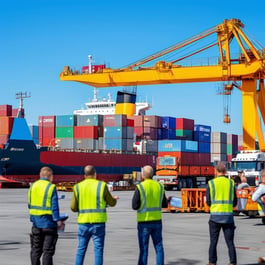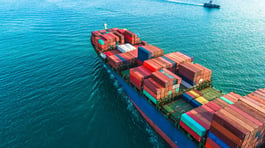At TradeLanes, we believe deeply in supporting the advancement of the global trade and logistics industry - and in supporting emerging leaders. Today, we’re sharing an article written by an , Nairoby Asprilla, who we got to know in Miami when TradeLanes won the Future of Logistics competition held by The LAB Miami. (She provides recommendations from an emerging professional to an established one at the bottom!)
Nairoby is Panamanian, graduated from Florida International University (FIU) with a degree in Logistics Engineering. She's interested in finding a position as a trader/logistics specialist.
We hope executives will consider connecting with Nairoby if you’re interested in growing your team in the future.
Read on!
Cheers,
The Team at TradeLanes
Perspective from an emerging leader in logistics: The ocean freight transportation challenges amid a pandemic
The rapid spread of the COVID-19 in early 2020 has disrupted the supply chain in the last months and will most likely continue to do so until the end of the year - affecting manufacturers, shipping companies, and 3PLs whose destination markets, in some cases, have been completely shut down due to the current crisis. Exports from mainland China dropped notably in February 2020 decreasing from 51.1 in January to 40.3 in February. Also, crude tankers dropped from an average of 3.4 billion tonne miles per day in 2019 to almost zero, according to data sourced from market intelligence service VesselsValue.
The shipping of non-necessary products is not developing as planned. Shippers cannot make reliable forecasts for the last two quarters of the year; and shipping transactions must be figured out almost in real-time. Even freight management digitization is being tested. So, what is the outlook for logisticians trying to get their business together amidst this pandemic crisis?
The fact is that the shipping industry is navigating uncharted waters. But not everythinghs been negatively affected: cargo such as health supplies and food are flowing, accelerating several businesses within the supply chain. As of July 3, the container volume at eight major ports in China increased by 3.57% compared to mid-June, and the export cargo throughput increased by 7.25% (Si, 2020). Some experts believe this could be an early sign of potential recovery in the global trade industry in the Asia region if the spread of the virus does not worsen, at least in China.
Nevertheless, according to an article on Statista, the decrease of 6.1% gross value added by the logistics industry is one estimation of the economic impact triggered by the COVID-19 (Mazareanu, 2020). The COVID-19 adverse effects vary across countries depending on how the nation's economy was pre-COVID, how hard the virus hit the country, and the measures enforced to control it. So far, what has been predicted is that the global freight forwarding market compared to last year is expected to fall off 7.5% this 2020 (Mazareanu, 2020).
This pandemic has punished many countries' economies. There is a dramatic decline in demand and supply, indicating a financial crisis in the second half of this year - “In a severe impact scenario, the North American sea freight forwarding market is expected to contract by 12.1 percent in 2020 compared with the previous year.” (Mazareanu, 2020). As a result, COVID-19 will have a significant impact on their profit and competitiveness across industries worldwide, such as automotive, electronics, pharmaceuticals, medical equipment and supplies, and consumer goods,
Analysis
As the world enters the ninth month of the coronavirus pandemic, there is still much uncertainty that embraces the global trade. Several nations are yet shut down to contain the virus. Others are dealing with a second wave, impacting their economy even more. As a result, this situation triggers significant consequences in the supply chain, disrupting the ocean, land, and air freight worldwide. Additional protocols such as social distancing and laid-off workers at ports, warehouses, and shipping companies had to be placed to ensure workers' safety, but this has contributed to the restriction movements of goods and bottlenecks for freight.
Moreover, the bullwhip effect could appear as another potential consequence under this uncertain situation. When cities are locked down again once reopened, it increases customer demands momentarily, making retailers order more wholesalers’ products to cope with these demands. Thus, the wholesalers order more from their suppliers and so on. This effect might also push importers to promptly bring goods as much as possible to those reopened cities in the next few weeks, as this crisis has made it almost impossible to determine how long this consumption pattern will continue.
On top of that, the Contracts of Afreightment (COA) have been drastically impacted by these extenuating circumstances. Even though some of them have “Force Majeure” clauses in their contracts, sometimes, if the liabilities are not stated clearly, it could lead to strong disagreements that can end in lawsuits affecting the smoothness process of shipping. Generally, major Logistics companies have legal experts that advise them to draw on “Force Majeure” when unforeseeable events disrupt the operation, but there are smaller businesses that do not take the proactive approach of having these type of clauses on their contracts or do not have the resources or legal teams to receive this sort of advice to deal with unpredicted events effectively. Thus, these companies are struggling in terms of accountability.
My perspective
As a young leader and professional in the industry, my perspective is that we have not yet learned nor deeply analyzed the lessons that the pandemic has given us so far. Suppose we examine the trends of human behavior, the high unemployment rate, and the accelerated re-openings. In those cases, we will notice that if we do not make the necessary adjustments now, those will lead us to have the same sort of shortages and problems in the last two quarters of 2020 and the first one in 2021. Thus, resulting in extremely high costs to the global economy and long-lasting complex effects for international trade.
To address these problems and keep the trade flowing smoothly amid this uncertain outlook, companies need to think beyond immediate solutions. To do this, they need to deeply understand the current market and their role in it to see where they can add value to the chain.
- International cooperation is necessary; companies need to start considering creating new strategic global partnerships to ease the transportation of goods and form new economies of scale.
- The digitization of operations, data sharing, and interoperability among ports, freight forwarders, shipping companies, etc. are essential now than ever, particularly in light of the increase in trade, considering how fast e-commerce has grown due to the pandemic. According to McKinsey & Company, it has had an acceleration of 10 years in a few months. This skyrocketing trend could be unsustainable if the digitization of operations is not addressed. Implementing those strategies will contribute to improving transparency and visibility, making it possible to plan earlier, easing the custom clearance processes.
Recommendations:
- Planning and learning from current upheavals is the key to prepare for future problems and challenges within the supply chain. It is necessary for companies to reevaluate their current risk contingency plans and develop new ones accordingly based on the new reality the industry is immersed in. It is Also, it’s critical for global trade companies to understand the level of risk they are willing to accept. This is better known as risk appetite. Evaluating or reevaluating their risks through a business continuity plan will help them increase their alertness and resiliency and maintain their competitiveness within the industry.
- It is also vital to proactively identify potential problems that have not occurred and plan accordingly for the effects those future threats may cause to global trade. Having a resilient supply chain is essential, but anticipating challenges is the next level of preparedness. According to Mckinsey & Company, disruptions to the supply chain that last one month or longer are expected to occur every 3.7 years on average; therefore, risk management plans must be considered a priority now and in the future.
- Lastly, keep your company and your team up-to-date with all the news and industry changes. As we all know, rules, regulations, and tariffs are modified continuously depending on the region/country your company is trading in. Factors such as natural disasters and political and geopolitical disruptions tend to accelerate these modifications. To avoid delays in your global trade chain, establish a more data-driven culture in your company to treat data as an asset and manage your enterprise in real-time. This will allow your team to respond better to unexpected changes or situations, and it will add value to your business.
Please contact me through email or LinkedIn Nairoby Asprilla, if you are interested in connecting with or hiring a Logistics Engineer.
References:
- 03, K. (2020, July 03). Container volume at major Chinese ports up 3.5% in late June. Retrieved July 07, 2020, from https://www.seatrade-maritime.com/ports-logistics/container-volume-major-chinese-ports-35-late-june
- Coronavirus: The impact on global shipping - Ship Technology Global: Issue 70: May 2020. (n.d.). Retrieved July 07, 2020, from https://ship.nridigital.com/ship_may20/coronavirus_impact_global_shipping
- Mazareanu, E. (2020, May 07). COVID-19 impact on the global sea freight forwarding market. Retrieved July 07, 2020, from https://www.statista.com/statistics/1115417/year-on-year-change-sea-freight-forwarding-market-worldwide/
- McKinsey & Company. (2020). Five Fifty: The quickening. Retrieved September 01, 2020, from https://www.mckinsey.com/business-functions/strategy-and-corporate-finance/our-insights/five-fifty-the-quickening
- Mazareanu, E. (2020, June 3). Topic: Coronavirus: Impact on the transportation and logistics industry worldwide. Retrieved July 07, 2020, from https://www.statista.com/topics/6350/coronavirus-impact-on-the-transportation-and-logistics-industry-worldwide
- Lund, S., Manyika, J., Woetzel, J., Barriball, E., Krishnan, M., Alicke, K., . . . Hutzler, K. (2020, August 19). Risk, resilience, and rebalancing in global value chains. Retrieved September 03, 2020, from https://www.mckinsey.com/business-functions/operations/our-insights/risk-resilience-and-rebalancing-in-global-value-chains




Leave a Comment